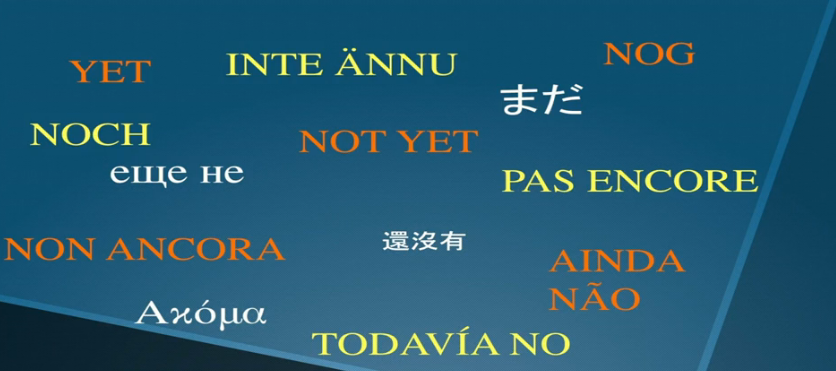THE POWER OF YET
Carol Dweck
I heard about a school at Chicago where
students had to pass a certain number of courses to graduate, and if they didn’t
pass the a course, they got the grade “Not Yet.” And I thought that it was
fantastic, because if you get a failing grade, you think, I’m nothing, I’m
nowhere. But if you get “Not Yet”,you understand you are on a learning curve. It
gives you a path into the future. “Not Yet” also gave me insight into a
critical event in my career, a real turning point. I hope to see how children
coped with challenge and difficulty, so I gave ten-year-old kids problems that
were slightly too hard for them. Some of them reacted in a shockingly positive
way. They said things like “I love a challenge,” or, “You know, I was hoping
this would be informative.” They understood their ability could be developed. They
had what I called a growth mindset. But other students felt it was tragic,
catastrophic. From their more fixed mindset perspective, their intelligence had
been up for judgment and they failed. Instead of luxuriating the power of yet,
they were gripped in the tyranny of now. So what did they do next? I’ll tell
you what did they do next. In one study, they told us they could probably cheat
the next time instead of studying more if they failed a test. In another study,
after their failure, they looked for someone who did worse than they did, so
they could feel really good about themselves. And in study after study, they
have run from difficulty.
Scientists measured the electrical activity
from the brain as students confronted an
error. On the left, you see the fixed mindset students. There’s hardly any
activity. They run from the error. They don’t engaged with it. But on the right
you have the students with the growth mindset, the idea that abilities can be
developed. They engaged deeply. Their brain is on fire with yet. They process
the error. They learn from it. They correct it. How are we raising our kids? Are
we raising them from now instead of yet? Are we raising kids who don’t know how
to dream big dreams? Their biggest goal is getting another A or another test
score? And are they carrying this need for constant validation with them into
their future lives?
Maybe employers are coming to me and saying we have already raised a generation of young
workers who can’t get through the day without an award. So what can we do? How can
we build bridge to yet? Here are something you can do. First of all, we can
praise wisely, not praising intelligence or talent. That has failed. Don’t do
that anymore. But praising the process that kids engage in: their effort, their
strategies, their focus, their perseverance, their improvement. This process
praise creates kids who are hardy and resilient. There are other ways to reward
yet. We recently teamed up with game scientists from the University of
Washington to create a new online math game that rewarded yet. In this game,
students were rewarded for effort, strategy and process. The usual math game
rewards you for getting answers right right now, but this game rewarded
process. And we got more effort, more strategies, more engagement over longer
periods of time, and more perseverance when they hit really, really hard
problems. Just the words “yet” or “not yet,” we’re finding, give kids
confidence, give kind a path into the future with greater perseverance. And we
can actually change students’ mindsets. In one study, I told them that every
time they push out of their comfort zone to learn something new and difficult,
the neurons in their brain can form new, stronger connections, and over time
they can get smarter. Look what happened: in this study, students who were not
taught this growth mindset continued to show declining grades over this
difficult school transition, but those who were taught this lesson showed a
sharp rebound in their grades. We have shown this now, this kind of improvement
with thousands and thousands of kids, especially struggling students. So let’s talk
about equality. In our country there are
groups of students who chronically underperform, for example, children in inner
cities, or children on native American reservations. And they’ve done so poorly
for so long that many people think it’s inevitable. But when educators create
growth mindset classrooms steeped in yet, equality happens. Here are just a few
examples. In one year, a kindergarten class in Harlem, New York scored in the
95th percentile on the National Achievement Test. Many of those kids could not
hold a pencil when they arrived at school. In one year, forth grade students in
the South Bronx, way behind, became the number one forth grade class in the
state of New York on the state math test. In a year to a year and a half,
Native American students in a school on a reservation went from the bottom of their district to the
top, and that district included affluent sections of Seattle. So the native
kids outdid the Microsoft kids. This happened because the meaning of effort and
difficulty transformed. Before, effort and difficulty made them feel dumb, made
them feel giving up, but now, effort and difficulty, that’s when their neurons
are making new connections. That’s when they are getting smarter. I received a
letter recently from a 13-year-old boy. He said, ”Dear Professor Dweck, I appreciate
that your writing is based on solid scientific research, and that’s why I decided
to put it into practice. I put more effort into my schoolwork, into my
relationship with my family, into my relationship with kids at school, and I experienced
great improvement in all of those areas. I now realized I’ve wasted most of my
life.” Let’s not waste any more lives, because once we know that abilities are
capable of such growth, it become a basic human right for children, all
children, to live in places that create that growth, to live in places filled
with yet. Thank you.


